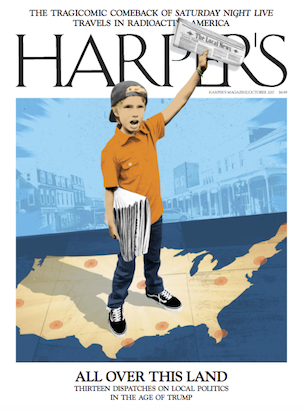Inside the October Issue
Marilynne Robinson, Andrew Cockburn, Ben Mauk, Elisabeth Zerofsky, Eileen Myles, and more...
 Whatever his faults (and they are far too numerous to list here), Donald Trump certainly has a gift for monopolizing the national news—for putting it in an egregious, fact-free headlock. Add to that the disappearance of regional papers across the country, and we can easily forget that vital events are still unfolding in our backyards. In “All Over This Land,” we have tried to put local politics back at center stage. The forum features a distinguished roster of contributors, including Edwidge Danticat (on immigration protests in Miami), Paul Theroux (on the Hawaiian microcosm), Jesmyn Ward (on health care in Mississippi), Marilynne Robinson (on Iowa’s lurch to the right), Lydia Davis (on dipping her toe into small-town government), Lisa Elmaleh (on eminent domain in West Virginia), and Steve Mumford (on fishermen in Maine). The tone is alternately indignant, wry, hopeful, despairing. Yet all of the pieces remind us that much of what goes on inside the Beltway is political theater—a kind of Kabuki for cable-news junkies—while real life transpires elsewhere, anywhere.
Whatever his faults (and they are far too numerous to list here), Donald Trump certainly has a gift for monopolizing the national news—for putting it in an egregious, fact-free headlock. Add to that the disappearance of regional papers across the country, and we can easily forget that vital events are still unfolding in our backyards. In “All Over This Land,” we have tried to put local politics back at center stage. The forum features a distinguished roster of contributors, including Edwidge Danticat (on immigration protests in Miami), Paul Theroux (on the Hawaiian microcosm), Jesmyn Ward (on health care in Mississippi), Marilynne Robinson (on Iowa’s lurch to the right), Lydia Davis (on dipping her toe into small-town government), Lisa Elmaleh (on eminent domain in West Virginia), and Steve Mumford (on fishermen in Maine). The tone is alternately indignant, wry, hopeful, despairing. Yet all of the pieces remind us that much of what goes on inside the Beltway is political theater—a kind of Kabuki for cable-news junkies—while real life transpires elsewhere, anywhere.
In “States of Decay,” Ben Mauk and photographer Balazs Gardi venture into America’s nuclear heartland, where the crumbling remains of our once thriving uranium industry have yet to be bulldozed out of existence. The old mines and waste sites are what we might generously call picturesque ruins. Yet even these Ozymandian eyesores are still capable of emitting toxic levels of radiation, and some may even reopen for business, should the industry emerge from its decades-long swoon. Elisabeth Zerofsky ventures further afield in “Everyman’s War,” to Lithuania and Estonia—where paramilitaries are preparing to fight off the Russian hordes. And in “Crime and Punishment,” Andrew Cockburn explores the possibility that the Saudis, whose connivance in the 9/11 attacks has been suspected for years, will finally face their accusers in court.
By now it may appear that Harper’s Magazine is your one-stop-shop for long-form dystopia. Not true! We revel in the lighter side as well—just take a look at Tom Bissell’s essay on the resurgence of Saturday Night Live. Technically speaking, of course, this resurgence is owed to the election of Donald Trump, so there is a whiff of dystopia after all. But Bissell is typically astute about the show’s long evolution, and about its fated intersection with our pernicious POTUS. In the end, he argues that Trump’s “brand of comedy—cruel and joyless and denuded of laughter—has become his cultural revenge.”
In Readings, we have a chronicle of canine coitus by Eileen Myles, a skinny poem by Dawn Lundy Martin, some dirty realism by Samanta Schweblin, and a frank confession by the Louisville Courier-Journal that the paper had incorrectly referred to a hot dog as a “sandwich” on multiple occasions between 1887 and 1966. (Take that, fake news!) Michelle Dean delves into the nightmare logic of the rebooted Twin Peaks, and David Means delivers some fictional fisticuffs in “Fistfight, Sacramento, August 1950.” Last but not least, there is another superb Easy Chair essay from Walter Kirn, in which he suggests that in this fight-or-flight moment for American civilization, “an affinity for or awe of certain creatures might be more motivating than fear for ourselves.”



